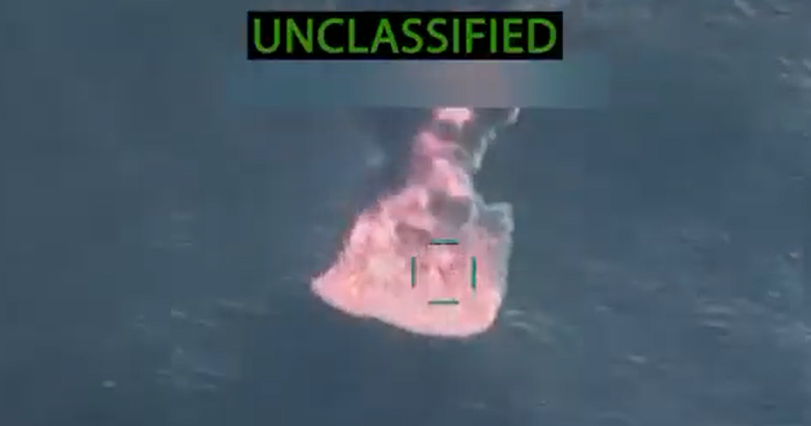In a significant escalation of military action, the U.S. military conducted airstrikes on four vessels accused of narcotics trafficking in the eastern Pacific Ocean, resulting in the deaths of 14 individuals and one survivor. This operation is part of an ongoing campaign targeting drug traffickers, which has now claimed over 50 lives since its inception. Defense Secretary Pete Hegseth emphasized that these actions are part of a broader strategy to confront narco-terrorism, drawing a parallel between these traffickers and terrorist organizations.
| Article Subheadings |
|---|
| 1) Overview of the U.S. Strikes |
| 2) Background on the Anti-Trafficking Campaign |
| 3) International Coordination in Rescue Operations |
| 4) Political Reactions and Controversy |
| 5) Future Implications of the Strikes |
Overview of the U.S. Strikes
On Monday, U.S. military forces targeted and struck four vessels suspected of narcotics trafficking in the eastern Pacific, resulting in 14 deaths and leaving one individual alive. The strikes were announced by Defense Secretary Pete Hegseth via social media platform X. The operations occurred at various times and locations, essentially in international waters, underscoring a critical focus on combating trafficking routes known to be exploited by narcotics organizations.
Details revealed the vessels had been under surveillance due to their known association with narcotics trafficking. For the strikes, Hegseth disclosed that a total of 14 individuals aboard the vessels were identified as narco-terrorists. The first strike resulted in eight fatalities, followed by four in the second strike, and three in the third strike. Notably, all operations were executed without any U.S. military personnel casualties.
Background on the Anti-Trafficking Campaign
This recent military action is part of an intensified effort by the U.S. government to combat drug trafficking, especially in regions vowing to undermine the drug trade’s influence. The campaign has reportedly claimed more than 50 lives overall, which is considered a significant escalation in U.S. military involvement in anti-drug operations.
Hegseth articulated the U.S. administration’s stance, asserting that drug traffickers are regarded as an existential threat. Quoting Hegseth,
“These narco-terrorists have killed more Americans than Al-Qaeda, and they will be treated the same.”
The message emphasizes a zero-tolerance policy toward drug-related violence, indicating a willingness to take extreme measures against those believed to be involved in trafficking.
International Coordination in Rescue Operations
Following the strikes, immediate search and rescue efforts were initiated for the lone survivor from the attacks. The responsibility for coordinating these operations fell to Mexican authorities, specifically the Mexican Navy. President Claudia Sheinbaum confirmed that the strike occurred in international waters, clarifying the parameters of the operation.
A statement from the Mexican Navy underscored their active role in rescue missions: they stated they were “conducting a maritime search and rescue operation 400 miles southwest of Acapulco” upon request from the U.S. Coast Guard. The fate of the survivor following this operation remains uncertain, reflecting the complexities involved in international military cooperation.
Political Reactions and Controversy
The airstrikes have ignited a mix of political reactions in the U.S. Sen. Rand Paul, a Kentucky Republican, has criticized the military actions, labeling them as “extrajudicial killings.” He raised concerns regarding the lack of substantial information provided to Congress about these operations, suggesting a lack of transparency from the administration.
During a recent news address, Trump expressed a strong commitment to the campaign against drug traffickers, underscoring a willingness to pursue military action. He asserted,
“I think we’re just going to kill people that are bringing drugs into our country.”
The hardline stance has drawn both support and condemnation from various political figures and constituents.
Future Implications of the Strikes
The implications of these strikes may extend beyond immediate operational success. Analysts suggest that such military actions could set a precedent for future engagements targeting narcotics organizations, potentially leading to escalated conflict. Trump hinted that land-based strikes in Venezuela could be next, indicating a broader strategy that may encompass various geographical areas viewed as drug-trafficking hubs.
As discussions around combating drug trafficking evolve, the extent of military involvement in such operations will likely continue to be a contentious issue. Observers suggest that the effectiveness and ethical implications of such actions will be scrutinized as more information comes to light and as American public opinion shifts.
| No. | Key Points |
|---|---|
| 1 | U.S. military strikes resulted in 14 deaths from drug trafficking vessels in the eastern Pacific. |
| 2 | Defense Secretary emphasized the serious threat posed by narco-terrorists, equating them with international terror organizations. |
| 3 | Search and rescue operations for survivors conducted by the Mexican Navy confirmed the international nature of the operation. |
| 4 | Political reactions vary, with calls for accountability surrounding military actions and their implications on Congress. |
| 5 | Future military actions could escalate, potentially including land strikes in other countries identified as drug trafficking sources. |
Summary
The U.S. military’s recent strikes against alleged drug trafficking vessels mark a significant increase in military intervention in narcotics operations. As this campaign continues, the implications of these actions will shape discussions regarding national security, international cooperation, and ethical considerations surrounding military engagement. With political reactions reflecting a division in opinions about the appropriateness of these measures, future developments will be closely monitored both domestically and internationally.
Frequently Asked Questions
Question: What led to the U.S. military strikes against the vessels?
The U.S. military strikes were part of a focused campaign against narcotics trafficking, responding to rising concerns about the influence and operations of narco-terrorists in the region.
Question: How did the Mexican authorities respond to the strikes?
Following the strikes, Mexican authorities, particularly the Navy, took on the responsibility of conducting search and rescue operations for the survivor found after the military engagements.
Question: What political repercussions have arisen from these military actions?
The strikes have led to political debates over military engagement policies, with some legislators questioning the legality and transparency of the operations, while others express full support for aggressive tactics against drug traffickers.
